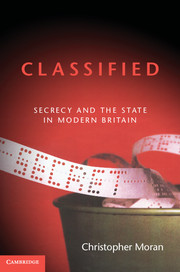Book contents
- Frontmatter
- Contents
- Illustrations
- Foreword
- Acknowledgements
- Abbreviations
- Introduction
- Part I 1889–1945
- Part II Secrecy and the press
- 3 Chapman Pincher: sleuthing the secret state
- 4 Britain's Watergate: the D-Notice Affair and consequences
- 5 Publish and be damned
- Part III Secrecy and political memoirs
- Part IV Intelligence secrets, spy memoirs and official histories
- Notes
- Bibliography
- Index
- Plate section
5 - Publish and be damned
Published online by Cambridge University Press: 05 April 2013
- Frontmatter
- Contents
- Illustrations
- Foreword
- Acknowledgements
- Abbreviations
- Introduction
- Part I 1889–1945
- Part II Secrecy and the press
- 3 Chapman Pincher: sleuthing the secret state
- 4 Britain's Watergate: the D-Notice Affair and consequences
- 5 Publish and be damned
- Part III Secrecy and political memoirs
- Part IV Intelligence secrets, spy memoirs and official histories
- Notes
- Bibliography
- Index
- Plate section
Summary
Journalism is becoming a high-risk occupation in this country.
Ron Knowles, National Union of Journalists, 1977The most likely candidate to fall foul of the government's new tough stance was Pincher. Emboldened by his success, the journalist had continued to cover in loving detail the inner workings of government. However, by no longer seeking guidance from the D-Notice Secretary, and by relying therefore on his own judgement and ability to second-guess the reaction of officials, Pincher was playing with fire. Former D-Notice Secretaries Admiral Thomson and Colonel Lohan, despite all of the latter's failings, had always been on hand to advise him about potential infringements of the Official Secrets Act; in contrast, Denning, the new Secretary, was someone who he refused to talk to, believing him to be a poodle of the government machine. In a lecture on ‘Press Freedom’, delivered in the Harcourt Room at the House of Commons in autumn 1969, Pincher suggested mockingly that Denning's job involved taking orders from Denis Healey, the secretary of state for defence, and referring to Healey as ‘Dad’.
True to form, Pincher succeeded in skating over thin ice. The closest he came to being prosecuted was in November 1971, after he published verbatim passages from a confidential ‘Haul-Down Report’, written by Admiral Sir William O'Brien, the recently retired Commander-in-Chief of the Western Fleet. The article triggered one of the largest leak enquiries in Whitehall's history, with over 300 officials being required to comment, either in questionnaire form or through witness testimony. Senior civil servants were delighted with the results, and believed that there was enough evidence to begin to build a case, should the government wish to pursue the matter. A number of interviewees had flirted with self-immolation by foolishly admitting that they knew Pincher and had lunched with him in the past. ‘One has to be permanently on one's guard because every piece of conversation is loaded,’ suggested one regular lunch partner, Commander Montanaro. Questionnaires had shown that the journalist had been spending a large amount of time in restaurants and bars around Whitehall, where there were good indications that naval officers had been talking shop. It also came out in the investigation that John Coote, general manager of the Express, could well have been the source of the leak since he had recently been put up for the Army and Navy Club, nicknamed ‘The Rag’, and was known to consort with service personnel.
- Type
- Chapter
- Information
- ClassifiedSecrecy and the State in Modern Britain, pp. 177 - 202Publisher: Cambridge University PressPrint publication year: 2012



